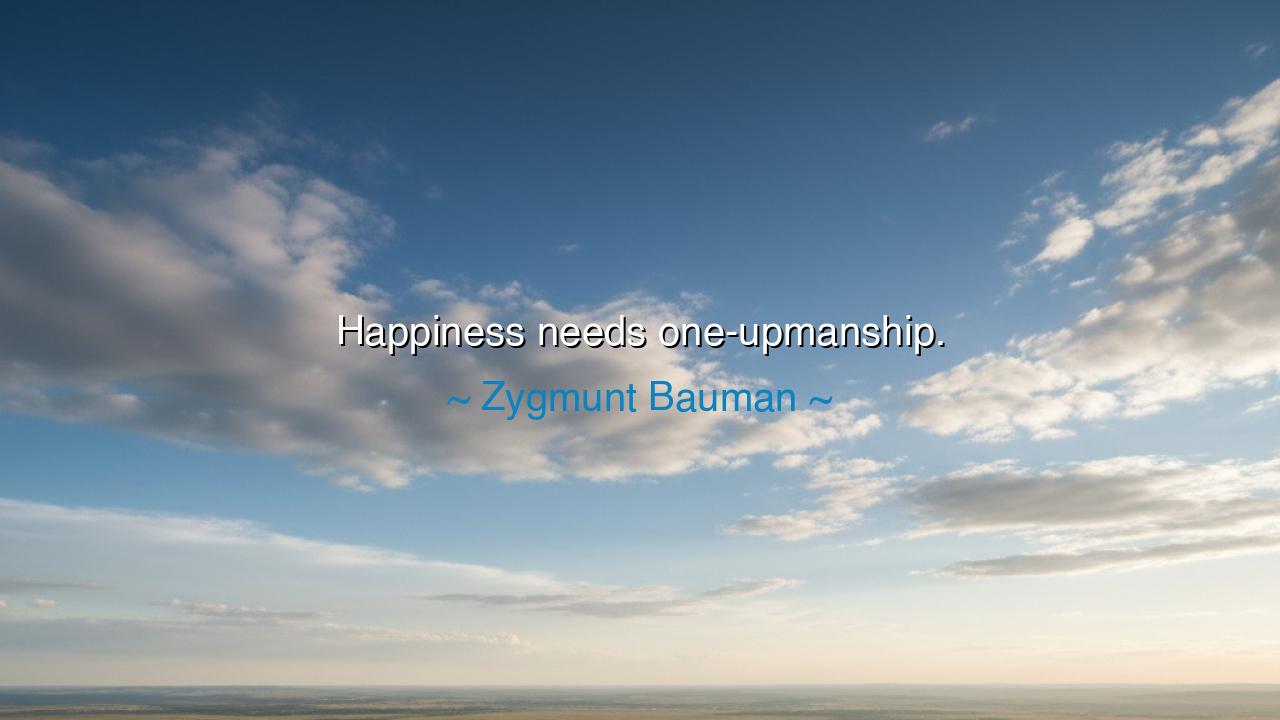
Happiness needs one-upmanship.






The philosopher Zygmunt Bauman, whose words often carried the quiet weight of prophecy, once wrote: “Happiness needs one-upmanship.” At first glance, the phrase seems almost cynical, as if he were mocking the human pursuit of joy. Yet beneath its sharpness lies a mirror—a reflection of the restless spirit of modern man. In this brief sentence, Bauman exposes a truth both sorrowful and profound: that in the world we have built, happiness is no longer a serene state of being, but a contest, a comparison, a race against others and against ourselves. What should be the still water of the soul has become a tide of competition, ever surging, never satisfied.
The origin of this thought lies in Bauman’s lifelong study of what he called “liquid modernity”—the condition of our age where everything, even emotion, is fluid, unstable, and easily consumed. He observed that in this modern world, people seek happiness as though it were a possession, something to be displayed and measured. To be happy, one must appear happier than another. To feel fulfilled, one must have more—more comfort, more approval, more success. Thus, the pursuit of joy becomes infected with comparison; we define our worth not by what we are, but by how we stand above others. It is a cruel irony: the more we chase this kind of happiness, the more fragile it becomes.
Bauman’s words echo a truth that even the ancients perceived in different form. The philosophers of Greece warned against envy as the enemy of peace. Epicurus taught that true joy could be found only in simplicity, friendship, and self-sufficiency—never in comparison. Yet mankind has always struggled with this weakness of the heart. Even in the ancient cities, men measured their happiness in wealth, women compared their beauty, and rulers their power. But in Bauman’s time, this disease of one-upmanship had become universal—woven into the very fabric of society, magnified by technology, media, and the illusion of progress.
To understand the depth of this truth, consider the story of Howard Hughes, one of the richest men in modern history. He possessed vast fortune, fame, and influence—every tool that society tells us should lead to happiness. Yet his life descended into isolation and madness. Why? Because his joy depended always on having more: more success, more control, more admiration. When one lives by one-upmanship, satisfaction is a mirage—each summit reveals another peak beyond it. Hughes’s empire grew, but his peace diminished, for he was a prisoner of comparison. In him, we see the tragedy of a soul that mistook happiness for victory.
Bauman warns that when happiness depends on being ahead of others, it becomes fragile as glass. It can shatter with every failure, every envy, every glimpse of someone who seems to have more. The ancient masters taught that true joy must be self-contained—a flame kindled from within, not lit by another’s shadow. Happiness born from one-upmanship is like a fire fed by oil: bright for a moment, then consumed by its own hunger. Such joy cannot endure; it devours itself, leaving only emptiness. The wise learn that peace begins when one steps out of the race and looks inward.
Yet Bauman’s insight is not merely a lament; it is also a warning and a call. If modern life teaches us to measure joy in comparison, then wisdom must teach us to measure it in contentment. We must turn from the mirror of others and gaze upon the garden of our own soul. Ask yourself: what makes my spirit bloom? What brings quiet to my heart, even when the world races past me? For the happiest souls are not those who have the most, but those who no longer need to prove anything. To them, happiness is not conquest—it is communion.
So, my child, take this lesson to heart: do not let your happiness depend upon the applause of others. Let it grow instead from gratitude, purpose, and love. Celebrate others’ joy without feeling diminished; see your journey not as a competition, but as a creation. The man who rises by lifting others climbs higher than the one who stands alone upon a pile of defeated rivals. Remember always—happiness that demands one-upmanship is fleeting, but happiness that springs from inner peace is eternal.
Thus, Bauman’s words endure as both mirror and warning. He showed us not what happiness must be, but what we have allowed it to become—a fragile prize in a game that never ends. Yet by seeing this, we are freed to choose differently. Step out of the race, dear one, and reclaim the ancient truth: that joy is not found in surpassing others, but in transcending the need to do so. For only then can you know the still, luminous happiness that no comparison can touch, and no loss can take away.






AAdministratorAdministrator
Welcome, honored guests. Please leave a comment, we will respond soon